Do you spend a lot of time and resources on your website, but it’s still not ranking at the top? It’s a clear signal that you need to focus on low-competition keywords! They’ll open new ways for you to finally reach potential customers and gain online authority.
Nonetheless, it’s not so easy to find the terms that balance between low competition and satisfying search volume. Luckily, our comprehensive step-by-step guide offers ultimate tips that will boost your online presence and lay the foundation for ranking more competitive keywords in the future.
- Longer search phrases get 1.76 times more clicks than single-word queries.
- An ideal term should feature a balance between decent search volume and low competition.
- Search intent, ranking difficulty, and business relevance are essential factors to consider while choosing SEO queries with low competition.
- You can find ideas for long-tail keywords using social media platforms like Reddit.
What Is a Low-Competition Keyword?
Low-competition keywords are terms that few websites compete for in Google results. They usually get less traffic but are easier to rank for, which makes them ideal for small or new sites.
For instance, ranking for a popular keyword like “lawyer services” is extremely challenging because thousands, if not millions, of attorneys try to target it. At the same time, a more specific, longer phrase like “personal injury lawyer in East Bay” obviously has less competition, making it easier to rank for.
You can use various tools to estimate the competition for a certain keyword. As a rule, this metric is represented by a difficulty score. For instance, here you can see the keyword difficulty (KD) for the phrase “lawyer services” estimated by Semrush:
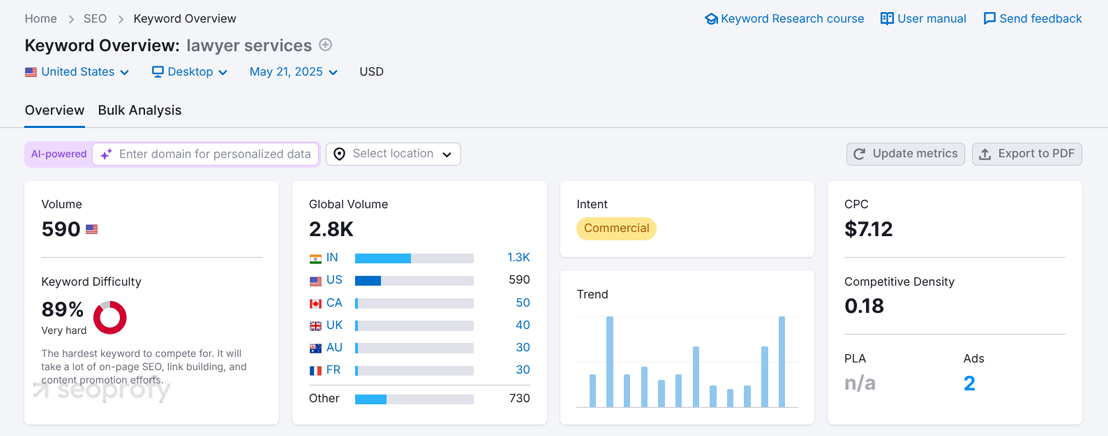
Considering that it has 89% out of 100, it’s truly hard to rank for such a search phrase. Thus, if you want to promote your lawyer services online, it’s better to look for options with a lower KD score.
Why You Need Low-Competition Keywords Research?
Despite attracting less traffic, niche-friendly search terms can provide your site with several key benefits, such as:
- First victories: When you start a new website, it’s better to avoid high competition keywords as you simply won’t be able to compete with sites that are more authoritative in the eyes of search engines. Thus, it’s better to start growing your website by implementing less competitive search phrases.
- More conversions: You need to find low-competition keywords and weave them into your content if you want to attract the clients who truly need your services or products. As a rule, people who use such terms look for something specific to make a purchase. Eventually, they are more likely to convert.
- Critical for competitive industries: In saturated markets like finance, healthcare, legal services, or e-commerce, established players dominate high-volume keywords with massive budgets and years of authority. For newer businesses, lightly targeted queries offer a realistic way to gain visibility and attract valuable traffic often missed by larger competitors.
- Credibility: When more and more of your pages start ranking for low-competition keywords, Google begins to trust your website, increasing its chances to target higher-volume terms and phrases.
Considering these benefits, the advantage of implementing low-competition keywords for SEO is undeniable. They offer you a great way to boost visibility, establish authority in highly competitive niches, and lay the foundation for targeting high-traffic search terms.
Low-Competition Keywords Examples
Why is your website not showing up on Google? Although there may be many reasons, the impossibility of standing up against more authoritative competitors is probably among the main ones. Luckily, low-barrier ranking terms can help you level up your pages, providing them with a strong chance to conquer the top in the future.
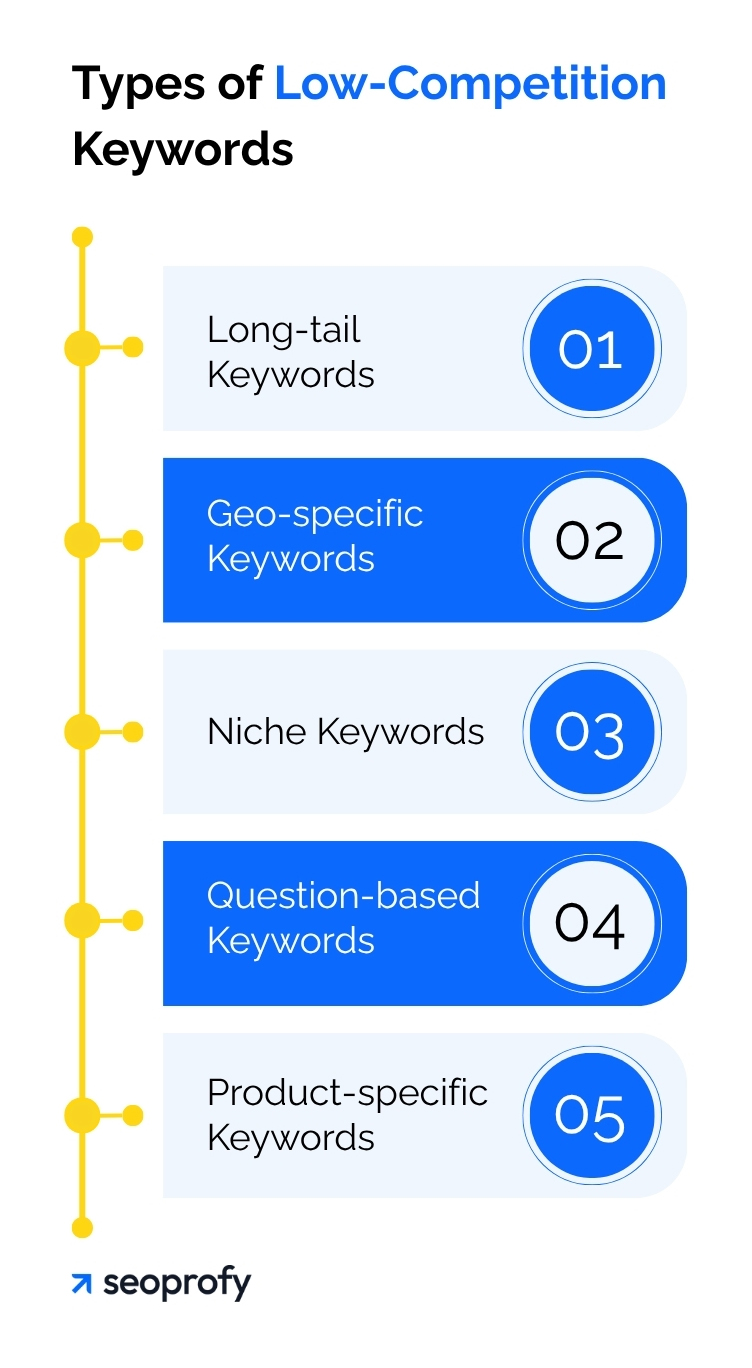
Although many people believe that these search phrases with lower search volumes are only the long-tail ones, this is far from the truth. Here, we’ve prepared a short review of the most popular types that have low KD but still ensure a steady flow of organic traffic to the website.
Long-tail Keywords
Long-tail keywords are specific phrases that usually include three or more words. According to our SEO stats, these broad keywords receive 1.76 times more clicks than single-word queries.
You probably wonder how to find low-competition keywords to reach your potential clients and boost rankings. The best way to deal with this task is to use the main search terms related to your industry and make them more specific.
For example, if you run an online store that sells sporting goods, you can opt for the low competition long-tail keyword “buy rubber hex dumbbells for home gym” instead of the ordinary “buy dumbbells”. In combination with advanced SEO techniques, these terms will definitely boost organic traffic and online authority.
Geo-specific Keywords
If you want to identify keywords with low competition, you should also pay attention to the terms related to the location where your company operates. This perfectly works for local businesses or enterprises that have units in different regions across the country. Thus, you can narrow the audience and make your pages more relevant in the local search.
For instance, if you run a legal services company in Brooklyn, you can opt for geo-targeted “best law firm in Brooklyn, NY” instead of high competition keywords like “best law firm”. Consider that local-specific terms work perfectly together with strong Google Business Profiles.
Niche Keywords
Niche-specific keywords allow you to reach people looking for distinct services or products within a large market or industry. They perfectly work for all types of businesses, including lawyers, eCommerce, SaaS, etc.
If you own a cloud storage platform, targeting simply “cloud storage services” is extremely challenging due to the unimaginable competition. Thus, it’s better to shift your focus to more specific terms, such as “secure cloud storage services for medical records”. Try to come up with as many ideas as possible to expand the keyword list. Eventually, you’ll get a lot of terms and phrases that will help you boost organic traffic and income by reaching a smaller but more engaged audience.
Question-based Keywords
These easier-to-rank phrases focus on the questions the users often ask in the SERPs, especially when they use a voice search feature. Considering this, it’s a brilliant idea to opt for them to drive your website rankings.
For instance, instead of ordinary “running shoes”, you can add to the content of your eCommerce website with more complex “What are the best running shoes for beginners?” Often, question-based keywords are used in FAQs. When you provide accurate, valuable answers, it boosts your site’s authority and increases your chances of ranking higher in search results.
Product-specific Keywords
Do you need SEO that brings leads to your website? The usage of product-specific keywords will help with this task, especially if you sell unique services or products. Instead of a highly competitive “personal injury lawyer”, you can opt for “dog bite injury lawyer for children” or “burn injury lawyer for fair compensation”. As you can see, the last two phrases include detailed product specifications, which allow you to reduce the competition and attract more qualified leads who are ready to take action.
How to Find Low-Competition Keywords: 6 Ways
And, now let’s get to the most interesting question — “How to find low-competition keywords with high traffic potential?” We’ve prepared six ultimate tips that include powerful SEO tools and time-tested practices to help you find real golden nuggets among numerous terms and phrases.
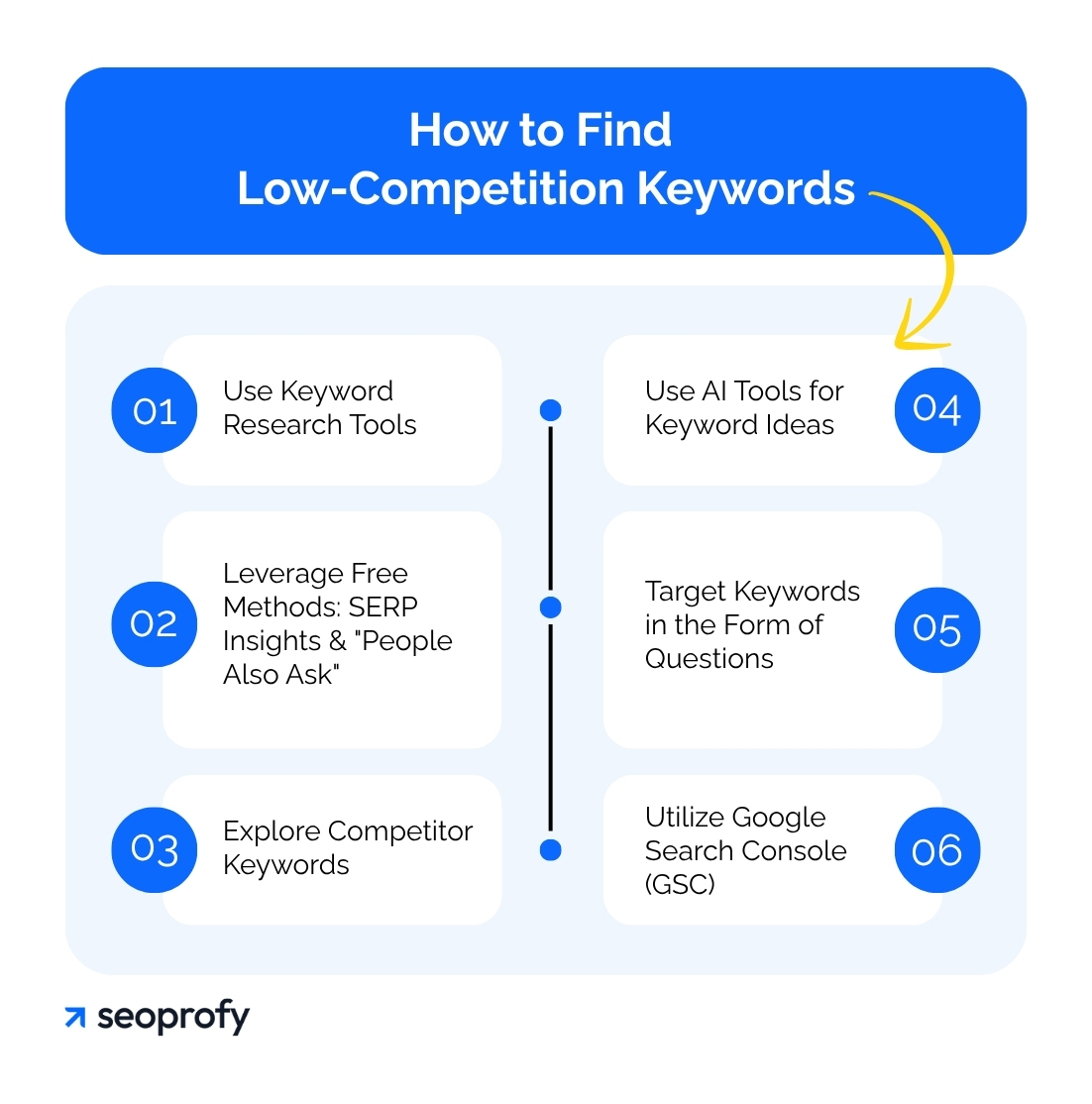
1. Use Keyword Research Tools
Many online platforms allow users to measure SEO results and conduct comprehensive analysis. At the same time, you can use these services to target low-competition keywords:
- Google Keyword Planner: It discovers the terms related to your niche, estimates how many searches they may receive, and the costs to target them. This great tool allows you to find low-competition keywords for free.
- Ahrefs: Designed with an advanced keyword research tool, Ahrefs allows you to discover SEO queries where ranking is more attainable.
- Ubersuggest: This powerful tool can help you find keyword ideas, considering the particularities of your business and target audience. It provides data on terms’ difficulty and search volume, and allows the website owners to use low-competition keywords with the highest potential.
- Semrush: You can opt for Semrush’s KD metric to indicate the options that offer easy ranking opportunities. This platform can also help you form a list of seed keywords.
All of the mentioned tools have filters that you can use to identify low-competition keywords with relatively high organic search volume faster. For instance, Semrush allows you to enter the focus phrases (e.g., “lawyer services”) and use KD and Volume filters to discover the terms that will perfectly match your potential clients’ search intents:
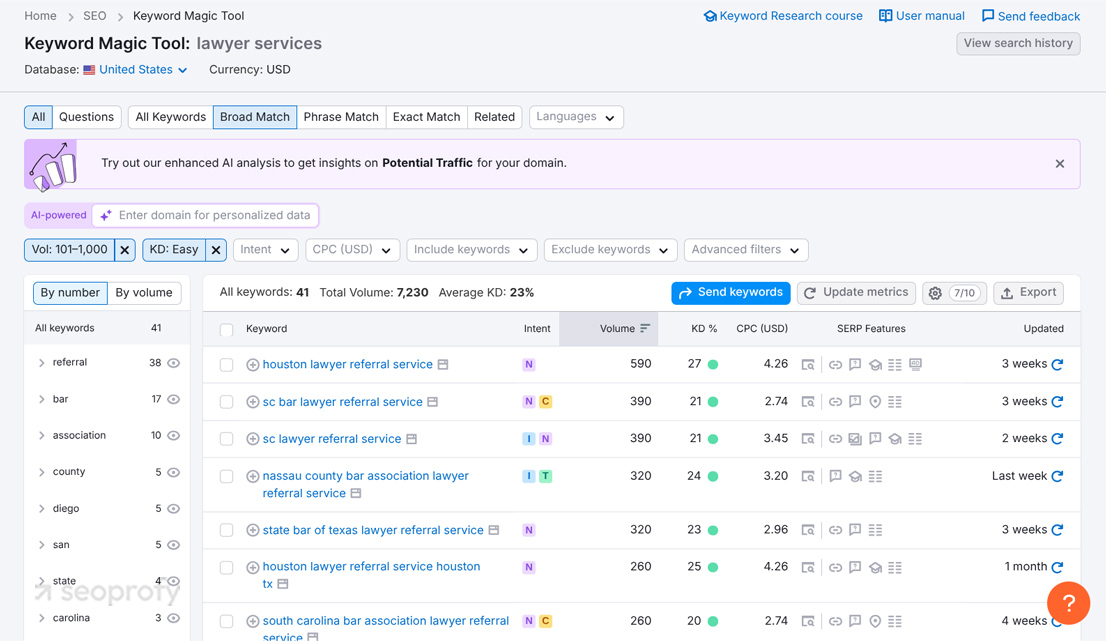
2. Leverage Free Methods: SERP Insights & “People Also Ask”
You can use Google itself to identify high search low-competition keywords absolutely for free. Probably, you’ve already noticed that SERP’s algorithms may also come up with different suggestions based on your search query:
- People Also Ask: This feature includes a set of related questions and answers to them. Analyzing them allows you to find out what other specific topics your audience is interested in.
- Related Searches: Unlike People Also Ask, Related Searches are located at the bottom of the search results. Usually, this feature includes the phrases your target audience also uses to search for services or products related to your niche.
- Google Autocomplete: When you type a query, Google tries to predict it in real-time. All its suggestions are based on the terms and phrases used by people who were looking for similar services, products, or information.
These free features offer you useful insights into related accessible organic keywords and questions from searches that may be interested in products or services you offer.
3. Explore Competitor Keywords
You can search for low-competition keywords by reviewing your competitor websites. That’s where Ahrefs or Semrush once again enters the game! These platforms provide a possibility to carefully analyze all aspects of the opponents’ SEO techniques.
For instance, you can use Semrush to discover low competition keyword opportunities for which your competitors rank. Here you can see how this platform analyzes the difference between the two legal sites:
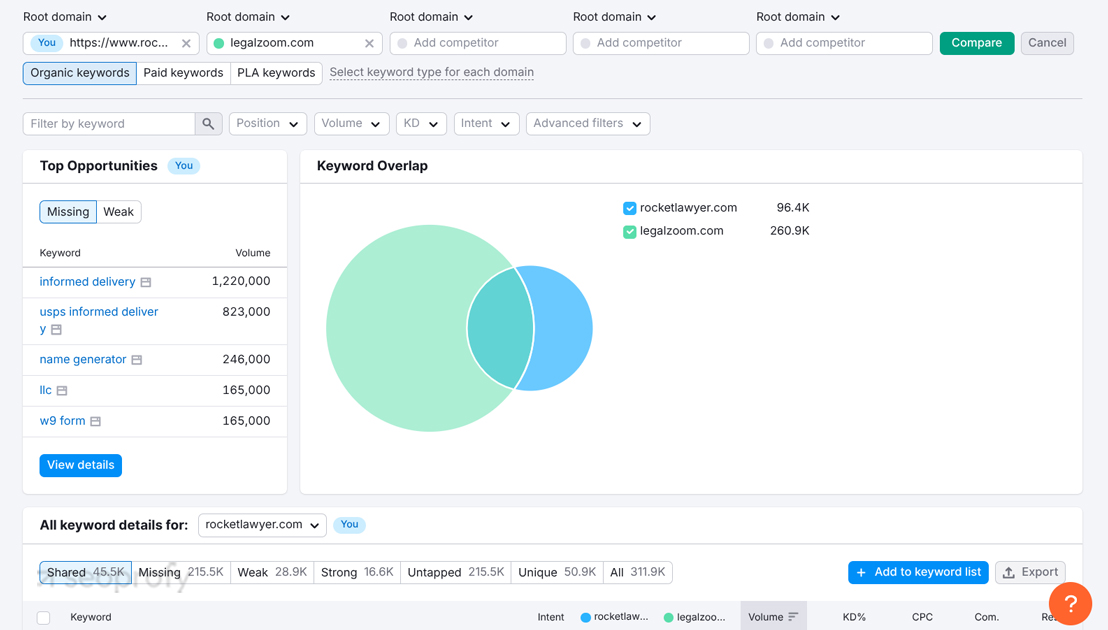
Semrush has a number of filters that you can use to compare keywords between your site and a competitor’s domain. Using them, you may highlight the terms with low KD and relatively high volume. It’s also possible to sort them by intent and position in SERPs if you need more detailed analysis. Afterwards, all you need is to come up with ideas on how to implement these phrases into your content to increase your pages’ rankings and gain more traffic.
Alternatively, you can opt for our professional keyword research services! We’ll conduct a comprehensive analysis, identifying new opportunities to expand your business, even in highly competitive niches.
4. Use AI Tools for Keyword Ideas
There are many AI tools for SEO, such as ChatGPT or Jasper. They can find underserved phrases without spending a lot of time and resources. Nonetheless, it’s important to write correct prompts for them to ensure they’ll find the right keywords. For instance, you may come up with the following message to your virtual assistant:
“Act as an SEO specialist to help me discover low-competition keywords. My niche is [NICHE]. I need you to give me the list of long-tail keywords that my potential clients are likely to look for. All the phrases and terms should have clear search intent (commercial, informational, etc.).”
Of course, you can experiment with the text until you get the desired result from your virtual assistant. Here is a part of a keyword list a personal injury law firm may get if it uses our prompt in ChatGPT:
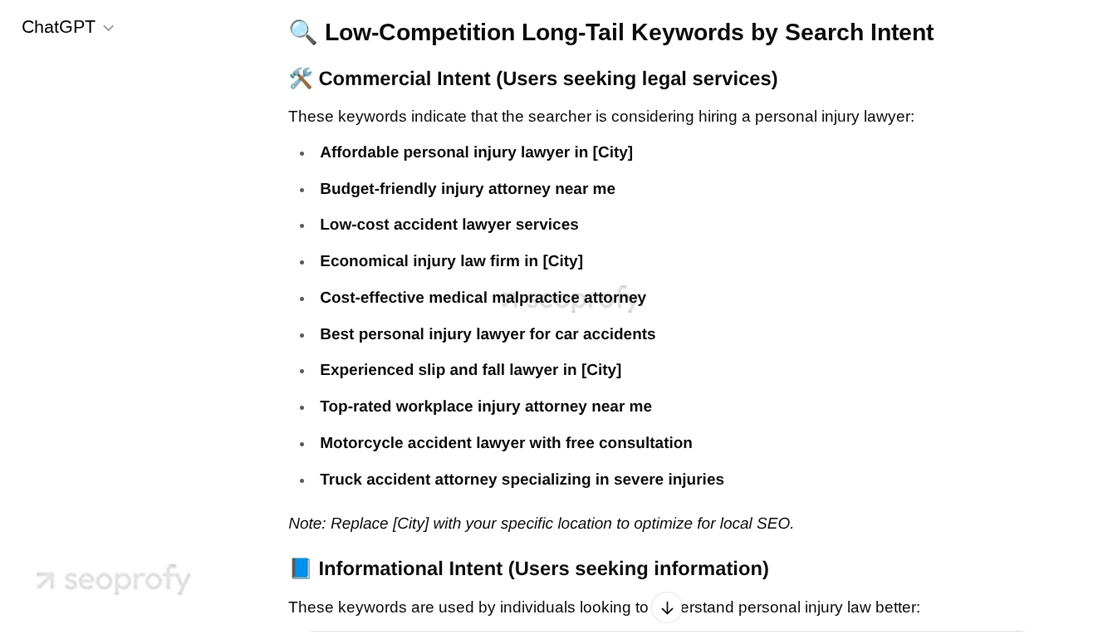
5. Target Keywords in the Form of Questions
People often look for answers to specific questions using “how to,” “what is,” etc., in the search queries. By providing accurate and valuable answers to the question-based keywords, you may improve search visibility, attract potential customers, and boost your authority. Moreover, you can find a lot of questions missed by your competitors. That’s where you might be the first to offer valuable insights and conquer the rankings.
As a rule, these SEO-friendly phrases are used in the FAQs or question-led content (e.g., an article titled “Who is a personal injury lawyer?”). You can discover them using free methods such as Google’s People Also Ask feature and ChatGPT. Plus, you may opt for Semrush’s Keyword Magic Tool (apply the “Questions” filter):
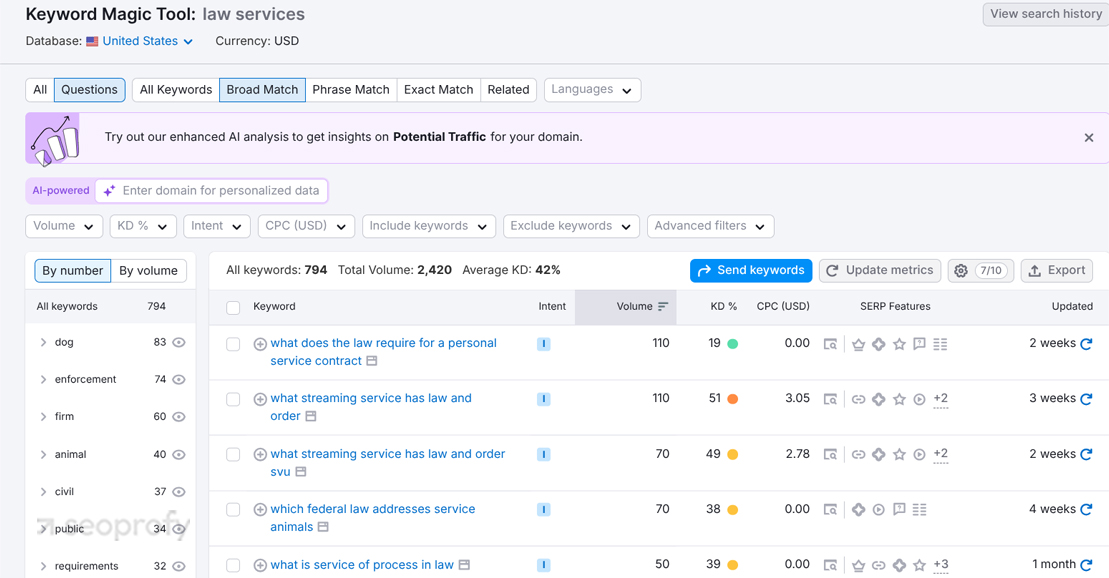
Another great way to discover keyword ideas based on questions is to visit popular online communities, such as Reddit and Quora. There, you can surely find the clients’ issues overlooked by your competitors. Here are some questions discovered on Reddit that a loan company may cover in its blog:
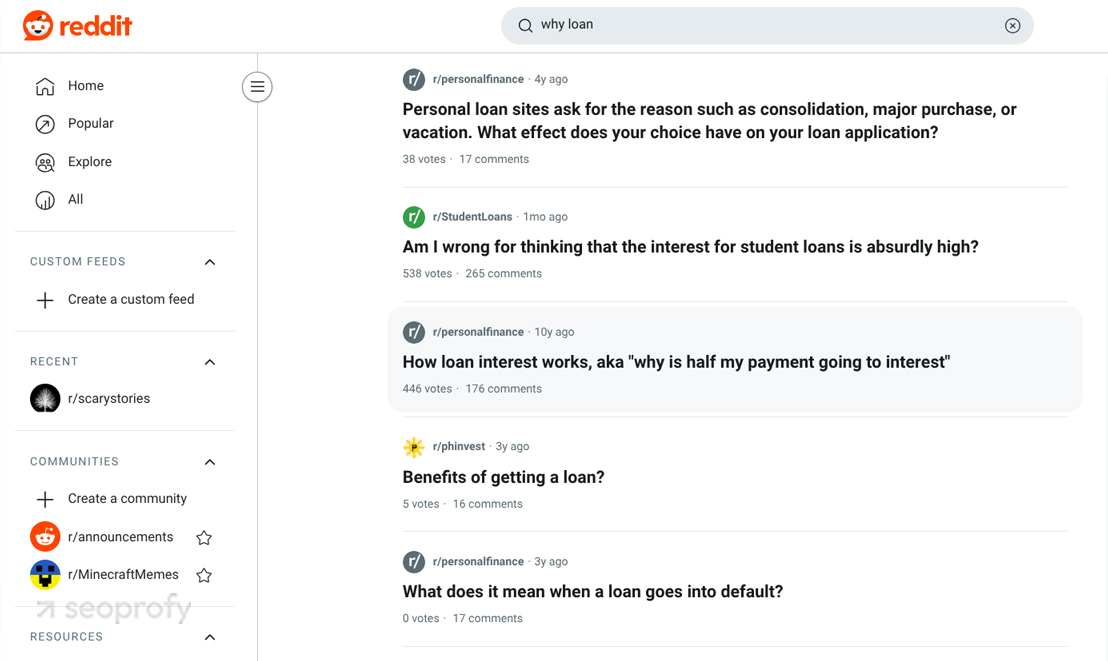
6. Utilize Google Search Console (GSC)
Google Search Console is a powerful tool that allows you to analyze your website’s performance in SERPs. You can use the provided information to improve your overall SEO strategy and find prospective low-competition terms.
For instance, you may discover the related keywords your site already ranks for, but there is still no dedicated content. Simply navigate to the “Queries” section in the “Performance” report to reveal all the terms leading to your site. Each of them will include the information about clicks and impressions, just like on the screen below:

You should manually look through the entire list, highlighting long-tail keywords with high impressions but low clicks. It means that users see your pages in organic search results when they enter these terms, but they don’t click on them. In this case, you may need to come up with a more compelling website URL and metadata or create an entirely new dedicated page.
Does looking for profitable keywords with low competition sound like an impossible challenge? SeoProfy will become your guide and boost your business with top-quality services:
- Conversion optimization in highly competitive niches
- Custom SEO strategies for new businesses
- Comprehensive website analysis

How to Analyse Low-Competition Keywords?
Analyzing keyword competition metrics is essential if you want to choose terms that are easy to target but, at the same time, will bring value to your website. Here, we’ve prepared six tips that will significantly simplify this process.
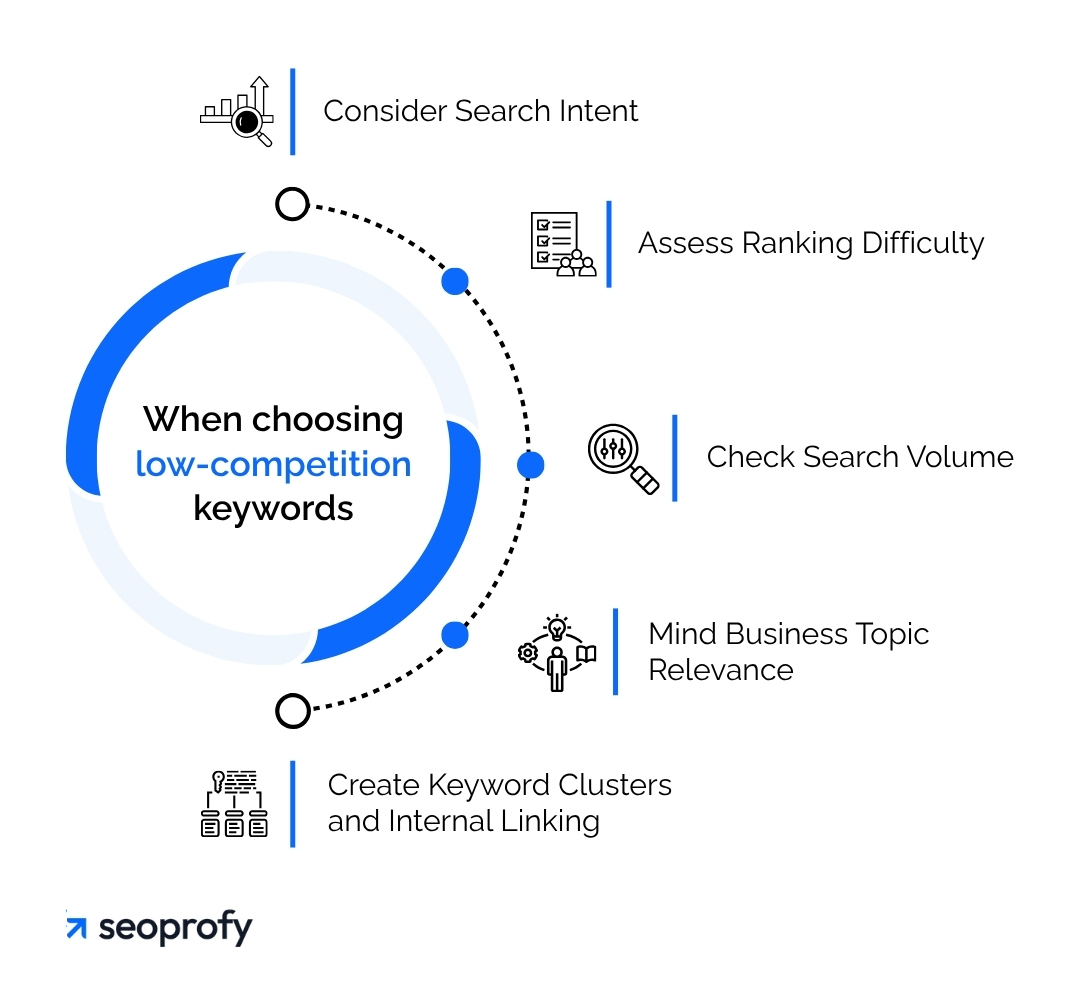
Consider Search Intent
All in all, there are four types of intent:
- Informational Intent: A person wants to learn something.
- Commercial Intent: A potential buyer searches for purchase options.
- Navigational Intent: A user looks for a particular page or site.
- Transactional Intent: A website visitor wants to take a specific action (e.g., complete a purchase).
Why is this important? While choosing keywords, you should ensure that they truly match what your clients are looking for. For example, the usage of informational search terms on commercial pages won’t be the best decision. Even if a user clicks on your website, they won’t find the desired information.
The truth is that low-competition queries may combine several types of intent. And if you have difficulties with the analysis, you can opt for Semrush. This platform automatically identifies the intent of each keyword and allows you to use them on the proper pages of your site:
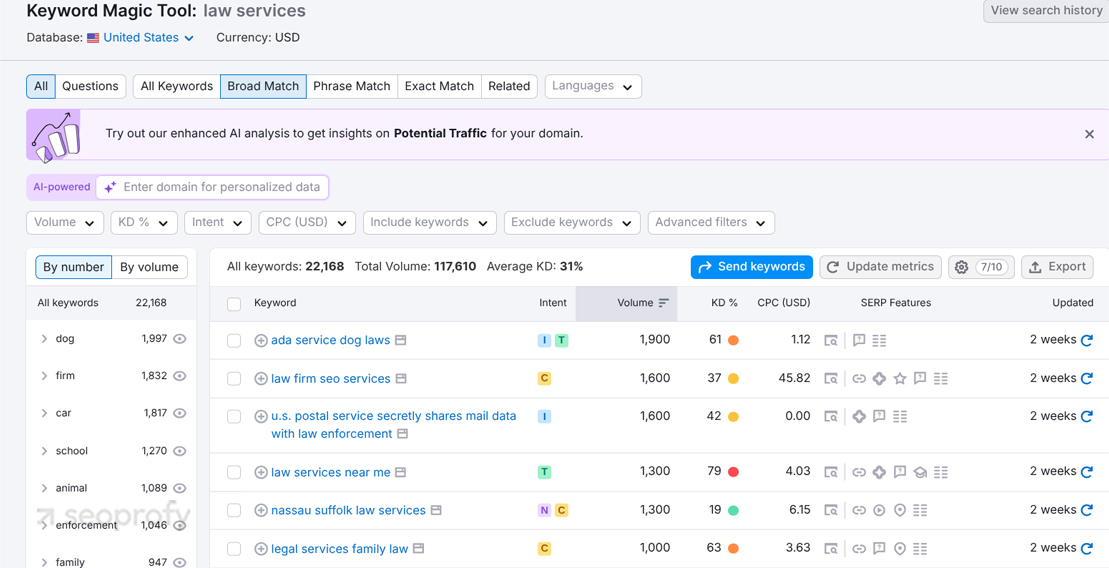
Assess Ranking Difficulty
It’s essential to estimate keyword difficulty with the help of special SEO tools like Moz. Thus, you can find out whether you can truly rank for a specific uncontested term or phrase. During this analysis, focus on the following metrics:
- Domain Authority: It estimates how likely a website is to rank in search results based on its overall link profile. The metric helps compare the authority of sites competing for the same underserved keyword.
- Page Authority: Unlike the metric above, this one shows only the individual authority of the highest-ranking pages for a specific term.
- Backlinks: It considers the number and quality of links pointing to top-ranking pages.
If you see that your website or pages don’t have enough authority score or backlinks to compete with your opponent, it’s better to look for another term with low keyword difficulty.
Check Search Volume
You are more likely to rank in a competitive niche if you manage to find high search volume terms with low competition. Platforms like Semrush allow you to choose a minimum search volume while analyzing the niche-friendly keywords. We recommend setting at least 500+ searches/month to ensure the low-competition term will actually bring in traffic to your pages.
Mind Business Topic Relevance
Simply using low-competition keywords isn’t enough to make your rankings grow. You need to ensure that the chosen terms align with your niche, target location, and audience. Using relevant, underserved phrases, you’ll create content that provides truly valuable information and leads to higher engagement and rankings. Also, proper choice of terms is essential to avoid keyword stuffing that may lead to serious consequences, such as Google’s penalties.
If you want to ensure the topic’s relevance, you need to analyze your target audience’s search intent, main competitors’ keywords, and trends in your niche. All this information will help you better understand what terms you should use to keep your rankings growing.
Create Keyword Clusters and Internal Linking
Grouping multiple keywords into clusters means organizing them by topic to use on related content pages. Afterwards, you’ll be able to tie them together through internal links. Such an approach is ideal for targeting low competition topics as it signals that your content has covered a subject comprehensively. This also helps guide visitors to different pages on your site, which can boost engagement.
Semrush’s Keyword Strategy Builder is a perfect option for creating these clusters. By entering the “Easy Start” section, the platform will show you the search terms with the best KD and volume balance that will perfectly match your list. Here is how this amazing tool can help an online shop that sells bikes:
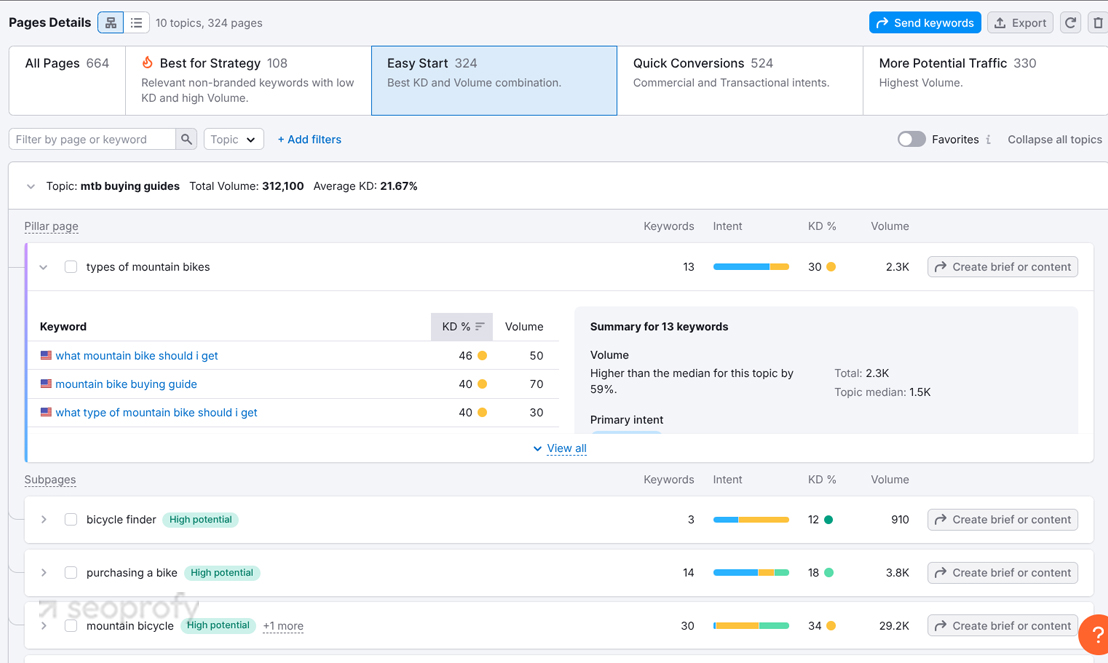
Boost Your Rankings in Rivalrous Niches with Low-Competition Keywords
Keywords low competition are undoubtedly a thing to consider, especially when you launch a new website or want to conquer the rankings in a highly competitive niche. These terms are like low hanging fruit, which you should reap. Overlooking them is an unforgivable mistake that may cost you rankings and, even worse, the lost opportunities to reach potential customers.
Luckily, SeoProfy is always ready to stand in good stead. If you believe you can’t deal with complex keyword analysis to identify the terms that will bring you the best results, our team is here to lend a helping hand! Together, we’ll make your rankings grow by conquering all the organic keywords with higher search volume and KD.













